Directors
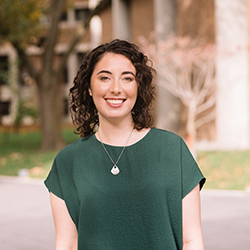
Elli Weisbaum, BFA, MES, PhD, works internationally facilitating mindfulness workshops and retreats in education, healthcare and business. At the University of Toronto, she is Assistant Professor (teaching stream) in the Buddhism, Psychology and Mental Health Program (BPMH), with a joint appointment to the Department of Psychiatry, in the Temerty Faculty of Medicine, with a cross-appointment to the Dalla Lana School of Public Health in their Institute of Health Policy, Management and Evaluation. At the heart of her teaching and research is an interest in cultivating learning and occupational environments where all members thrive. Her work draws on research from in neuroscience, education, healthcare and the workplace to explore how the scientific evidence base for mindfulness is integrated and operationalized across society. Past and ongoing collaborations include working with UofT’s Faculty of Law, Dalla Lana School of Public Health, Faculty of Engineering, Rotman School of Management, Physical Therapy Department, the Ontario Hospital Association, The Hospital for Sick Children, and Massachusetts Institute of Technology to integrate mindfulness into programming for faculty, staff, clinicians, patients and students.
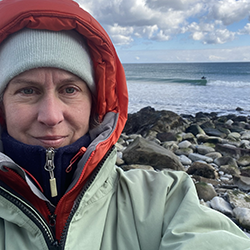
Frances Garrett, PhD, is Associate Professor of Buddhist Studies and Tibetan Studies in the Department for the Study of Religion, and she is Director of the Buddhism, Psychology and Mental Health Program at the University of Toronto. She studies intersections between Buddhist and medical histories with an interest in multi-epistemic and pluriversal modes of being and knowing. She has also worked in Eastern Tibet on how medical knowledge and practice is communicated through the Tibetan King Gesar epic, and recently she has worked with mountain communities in Sikkim. Frances has also published on language instruction, experiential learning, outdoor education, and teaching practices that promote student flourishing.
Affiliated Faculty

Alex Djedovic received his PhD from the University of Toronto in 2020. He is a philosopher working at the intersection of biology, cognitive science, and social issues. Focused on how the sciences of life and the sciences of mind inform (and sometimes mislead) each other, Alex writes on embodied cognition and theories of living organisms. An interdisciplinary scholar, he is also interested in how cognitive science influences society, non-Western approaches to cognition and their intersection with psychological and social health, the role of theory in making a better world, and the intersection of politics, history, and science.
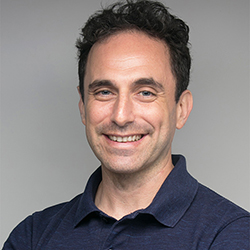
Norman Farb, PhD, is an Associate Professor of Psychology at the University of Toronto Mississauga, where he directs the Regulatory and Affective Dynamics laboratory (www.radlab.zone). He studies the psychology of well-being, focusing on mental habits, such as how we think about ourselves and interpret our emotions. He is particularly interested in why people differ in their resilience to stress, depression, and anxiety. Prof. Farb’s work currently explores online training to assess and support wellbeing, and neuroimaging to understand how emotional responses predict mental health over the lifespan.

Michel Ferrari is interested in personal identity and how it develops in typical and atypical populations. This interest extends to questions of personal wisdom, as an ideal aspiration of personal development. Dr. Ferrari is head of the Wisdom and Identity Lab, which explores personal wisdom in people of different ages (from children to the elderly) around the world. He led an international study of personal wisdom in Canada, the USA, Serbia, Ukraine, Iran, India, and China. He has also explored the relationship between wisdom and successful immigration to Canada among Iranian immigrants and Syrian Refugees. Dr. Ferrari and his students study the experience of personal identity in clinical populations, specifically individuals diagnosed with Autism. With Aftab Khan, Andrew Goodwin and Harrison McNaughtan he has studied of how young adults with Asperger’s Syndrome understand their own wisdom and identity.

Kenneth Fung is Staff Psychiatrist and Clinical Director of the Asian Initiative in Mental Health Program at the Toronto Western Hospital, University Health Network. He is Professor and Director of Global Mental Health with the Department of Psychiatry, University of Toronto. His research, teaching, and clinical interest include both cultural psychiatry and psychotherapy, especially Acceptance and Commitment Therapy (ACT), CBT, and mindfulness, with projects and collaborations in China, Hong Kong, and South Korea. He conducts community-based research and projects in stigma, resilience, mental health promotion, trauma, caregivers for children with ASD, immigrant and refugee mental health, and pandemic response. He is the Block Co-coordinator of the Cultural Psychiatry Core Seminars for psychiatry residents, and the seminar co-lead and psychotherapy supervisor in Cognitive Behavioral Therapy (CBT) at the University Health Network. He is also psychiatric consultant to the Hong Fook Mental Health Association. Dr. Fung is the immediate Past President and co-chair of the Education Committee of the Society of the Study of Psychiatry and Culture, the immediate past chair of the Transcultural Section of the Canadian Psychiatric Association, and an active Board Member of the World Association for Cultural Psychiatry. He is recognized as a Distinguished Fellow of the Canadian Psychiatric Association, Fellow of the American Psychiatric Association, and Fellow of Association of Contextual Behavioral Science (ACBS). His many awards include most recently the 2020 Colin Woolf Award For Sustained Excellence in Teaching, and the Canada 150 Medal. As a supporter of the arts, he is current Chair of the Board of Directors of the Little Pear Garden Dance Company.

Mark Miller is a philosopher of cognition who applies tools of conceptual analysis and theoretical model building to answer fundamental questions about human cognition – about the way that human beings think. His research investigates the implications of a leading new perspective on cognition, which conceptualizes the mind as an engine of knowledge-driven predictions. He explores how developments in cognitive neuroscience may help us gain a clearer understanding of the impact that our increasingly technologically-mediated world has on our happiness and well-being. He is developing new perspectives on contemporary discussions in domains such as human-computer interaction and socio-technical systems, with a specific emphasis on human flourishing.
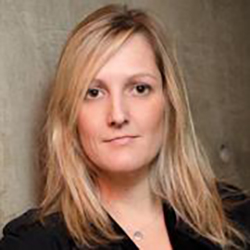
Catherine Sabiston is a professor in the Faculty of Kinesiology and Physical Education at the University of Toronto and the Director of the Mental Health and Physical Activity Research Centre. Catherine holds a Tier II Canada Research Chair in physical activity and mental health and has been awarded numerous career distinctions. Dr. Sabiston has over 300 peer-reviewed publications, has delivered over 500 presentations, is co-editor for two prominent textbooks in kinesiology. Catherine has held nearly $28 million in funding for her research broadly focused on psychosocial determinants and outcomes of physical activity. Dr. Sabiston’s research has been extensively featured in the media, has been used to inform evidence-based practice, and has advanced theory and methods in sport and exercise psychology. Catherine is Past-President of the North American Society for the Psychology of Sport and Physical Activity (NASPSPA), and is an editorial board member for the top journals in sport and exercise psychology. Important to her work, Catherine has developed meaningful and impactful industry and community partnerships to enhance sport and exercise experiences.
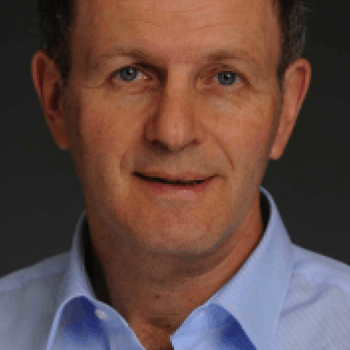
Zindel V. Segal, Ph.D., C.Psych, is a clinical psychologist whose research examines the use of mindfulness meditation in promoting affect regulation skills in people suffering from a depressive and anxiety based disorder. His research program has two broad thrusts involving 1) the use of brain imaging to identify neural markers of depressive relapse or resilience associated with long-term practice of mindfulness meditation and 2) evaluating the efficacy of mindfulness-based clinical interventions delivered via online or mobile platforms as a means of increasing access to care. Read more about Segal’s work at the Mindful Awareness Lab.

Paul Whissell is an interdisciplinary academic whose teaching program focuses on science, science communication, and the intersection of science with society. He first began teaching in 2015, shortly after attaining his Ph.D. in Neuroscience. He quickly found a love for the role and the community, both students and faculty. He has since taught over 40 courses in multiple academic units at several universities, including the University of Toronto and Ryerson University. As an instructor, Dr. Whissell has taught cutting-edge content, writing skills, debating strategies, presentation methods, and laboratory techniques to aspiring students from 1st to 4th year. Dr Whissell was the 2019-2020 Kathleen O’Connell Teaching Excellence Award winner.
Graduate Research Fellows

Téa Christopoulos is a PhD candidate at the Faculty of Kinesiology and Joint Centre for Bioethics at the University of Toronto. She earned her Master of Health Science in medical physiology from Temerty Faculty of Medicine. Her PhD dissertation explores the research areas of invisible disability, narrative medicine, medical uncertainty, and care ethics. She has a keen interest in physician suffering and wellbeing, which has led her to becoming a member of the research team focused on a mixed methods study on mindfulness for clinicians. Outside of her studies, Téa enjoys singing and is an alumna of the Toronto Children’s Chorus.
Current projects:
- Student RA, Applied Mindfulness Program for Medical Personnel – Temerty Faculty of Medicine (TFOM), University of Toronto, and the Ontario Medical Foundation (OMF)
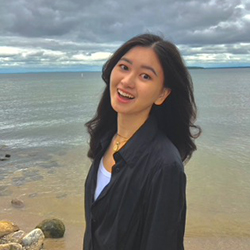
Kyobin Hwang is a recent graduate of the Bachelor of Health Sciences program at McMaster University and a current medical student at the University of Toronto. She was a Research Assistant at SickKids Research Institute, where she led a mixed-methods study investigating the role of mindfulness and other psychotherapies in reducing caregiving burnout. Now, she is extending her interest in this area to examine physician wellness. Kyobin is passionate about advocating for mental health support and resilience-building in healthcare. In her free time, Kyobin enjoys horseback riding and playing pickleball.
Current projects:
- Student RA, Applied Mindfulness Program for Medical Personnel – Temerty Faculty of Medicine (TFOM), University of Toronto, and the Ontario Medical Foundation (OMF)
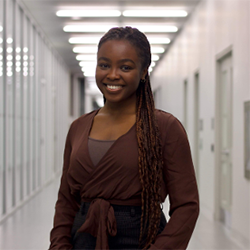
Anu Popoola is currently in her second year of medical school at the University of Toronto. She holds a Bachelor of Health Sciences degree with a specialization in Child Health from McMaster University. Anu has previously worked as a qualitative research assistant with McMaster’s Department of Family Medicine, the Black Health Alliance, and the Novo Nordisk Network for Health Populations. She is passionate about doing her part to help improve the health and educational outcomes of historically marginalized groups. In her free time, she loves to paint and learn new instruments.
Current projects:
- Student RA, Applied Mindfulness Program for Medical Personnel – Temerty Faculty of Medicine (TFOM), University of Toronto, and the Ontario Medical Foundation (OMF)

Honour Stahl is a Master of Environment and Sustainability candidate at the University of Toronto, researching embodied environmentalism and nature-immersive mindfulness to foster empowered agents of environmental change. She holds an Honours Bachelor of Arts in Ethics, Society, and Law, is a Buddhism, Psychology and Mental Health graduate, and holds a certificate in sustainability. With ten years of experience as a dance educator, she explores sustainability challenges through an interdisciplinary, mindful, and embodied lens. Her experience working with and leading environmental non-profits has also informed her practice, grounding her work in intersectional, community-based knowledge translation aimed at initiating and sustaining environmental and social wellbeing.

Kevin Wang is a medical student at the University of Toronto. He received his B.S. and M.S. in Molecular and Cellular Biology from the Johns Hopkins University, where he became interested in qualitative and QI research. Outside of lab, Kevin enjoys skiing, playing the piano, and trying new bubble tea shops.
Current projects:
- Student RA, Applied Mindfulness Program for Medical Personnel – Temerty Faculty of Medicine (TFOM), University of Toronto, and the Ontario Medical Foundation (OMF)
Undergraduate Research Fellows

Chloe Gauthier is a research fellow in her fifth-year at the University of Toronto, currently completing her B.Sc. (Hons) in Psychology with a double minor in BPMH and Religion. A background of 13 years in pre-professional ballet training has given Chloe a unique perspective to the study of mindfulness and its applications for mental and physical well-being. Chloe’s past and ongoing research projects explore the influence of self connection and social connection on student outcomes such as academic performance, physical and mental well-being, resilience, and hope. Native to the west coast, she most enjoys sunset walks along the beach with her family, trekking into the beautiful BC mountains, and a game of cards around a warm fire on a rainy day. She also adores her orange tabby, Diego, aptly named after the saber-tooth tiger from Ice Age.
Current Projects:
- Student Editorial Board, Mindfulness Guidebook and Gatha Book – Buddhism, Psychology & Mental Health Program (BPMH), New College, Faculty of Arts & Sciences, University of Toronto
- Student Principal Investigator under the supervision of Dr. Ashley Waggoner Denton, Department of Psychology, University of Toronto
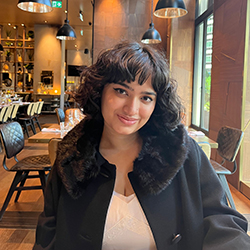
Shebonti Khandaker is a 4th-year undergraduate in Cognitive Science, History, and Semiotics. Her work explores the relationship between technology, cognition, and selfhood. She recently completed her undergraduate thesis with Prof. Mark Miller, titled “Extended Minds in the Attention Economy”, and has previously published on digital self-making in the essay “Social Media and Semiosis: Constructing the Self with Signs Online”. She is an awardee of the 2023 UofT Excellence Award for her work on Prof. Ivan Kalmar’s research project “Illiberal Discourses at the Periphery: Eastern and Southern Europe”, and the 2022 Meyer Greenstein Award for Writing Excellence for her publication “Tracing the Colonial Roots of Hijra Treatment in Bangladesh”. Outside of academia, Shebonti also loves film photography and riding her bicycle!
Recent projects:
- Student RA, Applied Mindfulness Program for Medical Personnel – Temerty Faculty of Medicine, University of Toronto, and the Ontario Medical Foundation.
- Arts & Culture correspondent for The Varsity, writing a series of interviews with cognitive science researchers to glean their fields’ insights on life and how to live it.
- 2024 Jackman Scholar-in-Residence: “Inner Trip: Marshall McLuhan and the Psychedelic 60s” archival research project and exhibition.
- 2023-24 Editor-in-Chief of The Future of History, an annual academic journal produced by the U of T History Students’ Association.
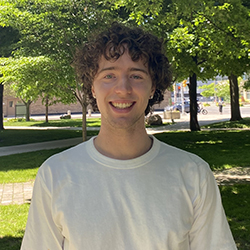
Andrew Long is a fourth-year undergraduate student in neuroscience, psychology, and physiology. Spanning from cellular mechanisms to clinical outcomes, his research delves into neural stem cell therapy for stroke and recovery patterns following ACL surgery. Andrew’s primary academic interests surround neurodegenerative disease, its progression, and their impact within a broader sociological context. Aspiring to a career in medicine, he is committed to making health information accessible to all, with his infographic on AIDS and menopause showcased at the Map and Data Library. Dedicated to supporting the health of his university community, he works as a first aid responder in the university’s gyms and activity spaces. Outside of the classroom, Andrew finds community and connection through film, sports, and cooking.
Current projects:
- Student RA, The Morshead Lab – Donnelly Centre for Cellular and Biomolecular Research, University of Toronto
- Student RA, Applied Mindfulness Program for Medical Personnel – Temerty Faculty of Medicine, University of Toronto, and the Ontario Medical Foundation.

Lauren Rego is a fourth-year undergraduate at the University of Toronto, majoring in Environmental Biology & Biodiversity and Conservation Biology, with a minor in BPMH. She is passionate about integrating mindfulness with environmental care, exploring how contemplative practices can deepen our relationship with the Earth and all beings. Lauren practices with the Wake Up Toronto Sangha, and took the 5 Mindfulness Trainings at her first Plum Village retreat in 2023. While Lauren’s current research is focused in Ecology and Evolutionary Biology, she hopes to inspire compassionate action within environmental work, fostering the interconnection of science, mindfulness, and sustainability. Outside of her academic and research pursuits, Lauren loves hiking, spending time with her cats, admiring her crystal collection, and being nourished by the beauty of nature.
Current Projects:
- Student Editorial Board, Mindfulness Guidebook and Gatha Book – Buddhism, Psychology & Mental Health Program (BPMH), New College, Faculty of Arts & Sciences, University of Toronto
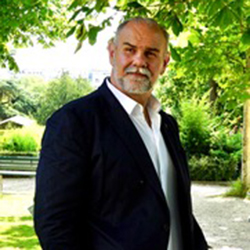
Bear Ramsay-St Claire recently returned from Yale where he was pursuing a BSc. in Psychology majoring in Behavioural and Cognitive Neuroscience. After University of Toronto, Bear plans to continue to a DPhil in Psychiatry focusing on Clinical Neuroscience. He completed summer research study fellowships at Sorbonne Université in Paris ’23 and Oxford University ’24 and is an American Indian Science and Engineering Society (AISES), and Yale Center for Environmental Justice Fellow (’24). His research examines memory, attention, and neuroencoding, focusing on how trauma impacts emotion regulation, embodied cueing, and sensory pathways. He explores the roles of neurosensory and somatic experiences, focused attention, meditation and identity in enhancing neuroplasticity, emotional regulation and resilience with trauma recovery. He examines differences in emotional regulation, resilience to stress, depression, and anxiety, using AI and neuroimaging to interpret neuro-sensory cues in BIPOC, first responders, veterans, and institutional settings. Bear serves as the CEO of a biotech incubator and accelerator specializing in venture capital and market development. He coaches Mindfulness meditation for DBT, CBT, and Transcendental Meditation (TM), working with groups focused on emotional regulation and resistant trauma. Bears hopes to prioritize decolonizing pedagogy, and bridge western science and global indigenous ways of knowing and being.
Current Projects:
- At Sorbonne Université (‘23), Bear researched Post-Structural AntiColonial Neurolinguistic Bias, examining the relationship between language, trauma, collective memory, and identity while connecting Indigenous epistemologies with neuroscience and healing in meditation practices.
- At Oxford University (‘24), Bear developed a proposed theory for encoding trauma memories at the neuroencoding and embodied cognitive level, focusing on how these processes influence emotional regulation responses, resilience, and trauma-informed clinical interventions. Bear is finalizing his findings for both publications this summer.
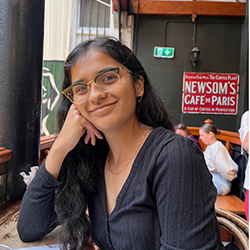
Mridula Sathyanarayanan is a third-year undergraduate student with an interest in contemplative science. Her degree aims to triangulate studies of the mind by combining a major in neuroscience with double minors in Philosophy and BPMH. Mridula’s core academic interests center around fostering greater understanding of how meditation inspires wholesome mental states. Equipped with this knowledge, she aims to make meditation accessible to scientific and lay communities. As a Laidlaw Scholar, Mridula led a fully-funded qualitative research study with longtime Buddhist meditators in Toronto. She has since also independently designed and delivered an introductory meditation course at Mind-BWW, a mental health charity in London, UK. In hopes of connecting with her local community, Mridula has recorded guided meditations for students at Victoria College. She has a love for all things related to food, and she loves to decompress by drawing light-hearted comics.
Current Projects:
- Student Editorial Board, Mindfulness Guidebook and Gatha Book – Buddhism, Psychology & Mental Health Program (BPMH), New College, Faculty of Arts & Sciences, University of Toronto
- Wellness Peer Advisor and Meditation Facilitator, Victoria College Wellness Department, Victoria University
- Meditation Course Creator and Facilitator: “Museum of Meditation”, Laidlaw Scholarship, University of Toronto
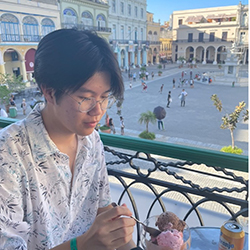
Yifei Wang is a research fellow with an interdisciplinary background in psychology and contemplative sciences, currently completing a B.Sc. (Hons) in Psychology with a minor in BPMH at the University of Toronto. Yifei’s research focuses on mindfulness and mental health, with extensive experience at the Rotman Research Institute at Baycrest, where he has contributed to multiple projects on cognitive health, aging, and mindfulness. This includes currently co-leading a study on mindfulness and Parkinson’s disease. Yifei’s work is deeply informed by Buddhist principles and personal practice bonded with Fo Guang Shan Temple. As Editor-in-Chief of the Undergraduate Journal of Buddhism and Psychology, Yifei fosters academic discussions on the intersections of psychology, mindfulness, and compassion. Overall, Yifei’s goal is to bridge contemplative practices and empirical research to advance holistic approaches to mental health in clinical, academic, and community settings.
Current Projects:
- Student Editorial Board, Mindfulness Guidebook and Gatha Book – Buddhism, Psychology & Mental Health Program (BPMH), New College, Faculty of Arts & Sciences, University of Toronto
- Individual Project Researcher, Neurofeedback Mindfulness for Parkinson’s Stress Relief, VisAge Lab, Rotman Research Institute, Baycrest
Affiliated Graduate Researchers
Delaram Farzanfar received her BA in Architecture from Toronto Metropolitan University, and her B.S in Neuroscience from the University of Toronto. She received her MA in Clinical Psychology from York University and gained experience working as a psychotherapist. She is currently a PhD student in Psychology at the University of Toronto. Her research focuses on understanding neural activity during creative states and subjective experiences of the self. She is interested in implications of reflective experiences for improved well-being. Dela enjoys making music, doing yoga and spending time in nature.
Maria Keller is a PhD candidate in the Department of Philosophy working on phenomenological psychopathology. Her dissertation addresses aspects of the phenomenology and messy nosology of depression. In the dissertation, she’s developing a new view — which she refers to as The Perception View — that highlights the distinct perceptual phenomenology of depression. In light of The Perception View, Maria argues for a reframing of the contemporary discourse on depression, which could plausibly have implications for treatment.
Marybel Menzies is a graduate student pursuing her PhD in the Department of Philosophy. Her primary research interests include work at the intersection of philosophy of mind and value theory. Specifically, she is interested in the value of consciousness and its application to biomedical conditions such as vegetative states and locked-in syndrome. Outside of academia, she enjoys swimming, dancing, perusing natural landscapes, listening to music, photography, and travel.
Olivia-Autumn Rennie is an independent filmmaker and 4th-year MD/PhD student at the University of Toronto. At the Institute for the History and Philosophy of Science and Technology, Autumn is particularly interested in philosophies of science and medicine, and how these fields intertwine with cinematic technologies. As a filmmaker, academic researcher, and physician-in-training, Autumn works to leverage the power of screen-based media to raise awareness about critical issues in medicine and society. Her PhD is a ‘research-creation’ project, producing films that challenge ideas surrounding disability, and develop a truly ‘collaborative’ filmmaking approach which enables patients to become key players in the filmmaking process themselves. With an educational background originally in neuroscience, she is particularly interested in exploring the lived experience of individuals with neurological and/or psychological diseases, disorders, or injuries.
Claire Zhang is a medical student at the University of Toronto and received her BSc from McGill University. Her research interests include mindful self-compassion training, compassion in medical education, and student mental health. She aims to use qualitative research methods to explore these topics and develop nuanced, holistic recommendations for change in both the formal and hidden curricula.
Affiliated Undergraduate Researchers
Janet Pham is a fourth-year undergraduate at the University of Toronto, pursuing a Psychology Specialist, Neuroscience Major, and BPMH Minor. Her research interests include cognitive neuroscience, brain health, neurotechnology, contemplative science, and mental health. Her current independent research focuses on neurofeedback-assisted meditation and mindfulness for individuals with Parkinson’s disease and their caregivers. Janet has extensive research experience at the Rotman Research Institute at Baycrest, contributing to various projects exploring vision, aging, cognitive health, and neurodegenerative diseases. As Treasurer, Vice President, and now President of the Buddhism and Psychology Student Union (BPSU), she is deeply involved in the BPMH community on campus. Outside of school, Janet has played competitive tennis for over 12 years. She is on the UofT Women’s Varsity Tennis Team and is a tennis instructor for the Faculty of Kinesiology and Physical Education.
Sophia Leung is an undergraduate student majoring in Linguistics and Human Geography, with a minor in BPMH at the University of Toronto. She is currently the Associate Editor of the Undergraduate Journal of Buddhism and Psychology, where she aims to foster discussions on contemplative science through undergraduate research, writing and artwork. She is involved in various initiatives and causes, including, but not limited to, education, mental health, and social justice. She has collaborated with non-profits and student clubs on a range of projects, including translation, transcription, illustration, social media content creation, and more. With a commitment to creativity and diverse perspectives, Sophia strives to make a meaningful impact on the community. Outside of academic life, Sophia enjoys illustration and baking. Always eager to learn, she seeks opportunities that bridge mindfulness, the arts, social sciences, and sustainable practices.
Nicolas Viulet is a fourth-year undergraduate student, pursuing a Specialist in Neuroscience with a minor in BPMH. He is currently focused on writing a systematic review, analyzing the effects of psilocybin on mood brain networks in depressed versus healthy individuals. This review contributes to the critical mass of research, within the internationally recognized psychiatry department at the Sunnybrook Research Institute (SRI), which focuses on understanding the causes and optimal treatments for Mood and Anxiety Disorders, Multiple Sclerosis, Traumatic Brain Injury, and Dementia. Nicolas is also integral to the Brain Organization for Language and Literacy Development (BOLD) Lab at OISE, which studies how children’s brains develop to support cognitive, language, and socio-emotional skills, focusing on diverse experiences such as bilingualism, poverty-related risk factors, and refugee displacement. Nicolas hopes to expand the influence of the BPMH program, as the current Treasurer, and integrate his research interests with broader efforts of promoting the inclusion of marginalized groups in scientific research. Beyond academia, Nicolas is interested in the ethical production and tasty consumption of coffee.
Esther Wing is an undergraduate student majoring in Psychology with minors in Buddhism, Psychology & Mental Health (BPMH), and Sociology. She has a strong passion for clinical psychology, mental health, and exploring the transformative role of mindfulness in enhancing well-being. As the Social Events Coordinator for the Buddhist Psychology Student Union (BPSU) and the Student Representative for the BPMH program, she advocates for students, fosters community engagement, and organizes initiatives that integrate psychology, mindfulness, and mental health. She also serves as an editor at UPAYA Journal, a contemplative science journal at UofT. Her research explores various psychological topics, including mindfulness-based interventions for perinatal depression, which she will present at the SickKids Mindful and Compassion Round in July 2025. Driven by a deep curiosity and a commitment to making a tangible impact, she strives to connect research, advocacy, and real-world applications to promote mental well-being for individuals and communities.